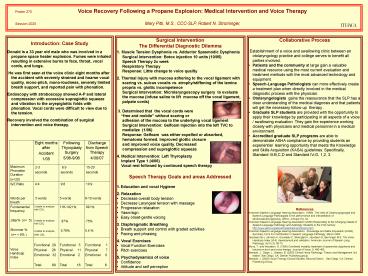Introduction: Case Study PowerPoint PPT Presentation
1 / 1
Title: Introduction: Case Study
1
Poster 270 Voice Recovery
Following a Propane Explosion Medical
Intervention and Voice Therapy Session 2025
Mary Pitti, M.S.,
CCC-SLP, Robert N. Strominger,
Introduction Case Study Donald is a 33
year old male who was involved in a propane space
heater explosion. Fumes were inhaled resulting in
extensive burns to face, throat, vocal cords, and
lungs. He was first seen at the voice clinic
eight months after the accident with severely
strained and hoarse vocal quality, mono-pitch,
mono-loudness, severely limited breath support,
and reported pain with phonation. Endoscopy with
stroboscopy showed A-P and lateral compression
with excessive supraglottic squeeze and vibration
to the aryepiglottic folds with phonation. Vocal
cords were difficult to view due to the tension.
Recovery involved the combination of surgical
intervention and voice therapy.
- Surgical Intervention
- The Differential Diagnostic Dilemma
- 1. Muscle Tension Dysphonia vs. Adductor
Spasmodic Dysphonia - Surgical Intervention Botox injection 10
units (10/05) - Speech Therapy 2x week
- Respiratory Therapy
- Response Little change to voice quality
- 2. Thermal Injury with mucosa adhering to the
vocal ligament with - scaring vs. sulcus vocalis vs.
atrophy/stiffening of the lamina - propria vs. glottic incompetence
- Surgical Intervention Microlaryngoscopy
surgery to evaluate - the mucosa (infuse saline to lift mucosa
off the vocal ligament, - palpate cords)
- 3. Determined that the vocal cords were
- free and mobile without scaring or
- adhesion of the mucosa to the underlying
vocal ligament - Surgical Intervention Gelfoam Injection
into the left TVC to
- Collaborative Process
- Establishment of a voice and swallowing clinic
between an otolaryngology practice and college
serves to benefit all parties involved. - Patients and the community at large gain a
valuable medical resource using the most current
evaluation and treatment methods with the most
advanced technology and equipment. - Speech-Language Pathologists can more effectively
create a treatment plan when directly involved in
the medical diagnostic process with the
physician. - Otolaryngologists gains the reassurance that the
SLP has a clear understanding of the medical
diagnosis and that patients will get the
necessary follow-up therapy . - Graduate SLP students are provided with the
opportunity to apply their knowledge by
participating in all aspects of a voice /
swallowing evaluation. They gain the experience
working closely with physicians and medical
personnel in a medical environment. - Accredited graduate SLP programs are able to
demonstrate ASHA compliance by providing students
an experiential learning opportunity that meets
the Knowledge and Skills Acquisition (KASA)
guidelines. Specifically, Standard III-B,C,D and
Standard IV-G, 1,2, 3.

